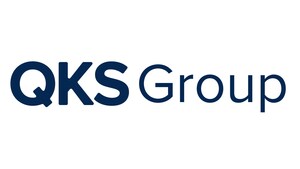Risk-Based Adaptive Market Set for Explosive Growth, Projected to Reach $2.98 Billion by 2030
MIDDLETON, Mass., April 8, 2025 /PRNewswire/ -- QKS Group, a premier market intelligence and advisory firm, has released its latest in-depth analysis of the global Risk Based Adaptive Authentication (RBA) Market, providing key insights for industry leaders looking to capitalize on this rapidly expanding market. The new reports - 'Market Share: Risk Based Adaptive Authentication (RBA) Market, 2024, Worldwide & Regional Report' and 'Market Forecast: Risk Based Adaptive Authentication (RBA), 2025-2030, Worldwide & Regional Report' - reveals a projected market valuation of $2.98 billion by 2030, growing at a CAGR of 15.52% from 2025 to 2030. This analysis equips businesses with the strategic intelligence needed to navigate the dynamic RBA landscape and make informed decisions as the market continues to evolve.
The Next Growth Frontier in Risk-Based Adaptive Platforms
In an era where cyber resilience is pivotal to business continuity, Risk-Based Adaptive Authentication (RBA) has emerged as a cornerstone technology for organizations aiming to balance security and user experience. From banking and finance to healthcare, retail, telecom, and manufacturing, enterprises are rapidly adopting AI-driven RBA solutions to dynamically assess risk, pre-empt threats, and adapt access controls in real time. By leveraging contextual data such as user behavior, device posture, and transaction patterns these platforms enable seamless yet secure authentication, reduce fraud losses, and ensure compliance with evolving regulations. As cyberattacks grow more sophisticated, RBA is becoming indispensable for organizations prioritizing agile security frameworks that minimize friction, protect sensitive assets, and future-proof operations in an increasingly interconnected digital landscape.
According to Sanket Kadam, Analyst at QKS Group, "Risk-Based Adaptive Authentication (RBA) solutions are no longer just about static security checks they're vital to enabling enterprise resilience, dynamic threat response, and long-term adaptability. With the integration of AI-driven behavioral analytics, real-time risk scoring, and contextual insights, leading RBA platforms are redefining how businesses balance security with seamless user experiences. These innovations empower organizations to preempt evolving threats while ensuring compliance and fostering trust in an increasingly interconnected digital ecosystem."
Key Market Insights from QKS Group's Report
- Global and Regional Market Analysis: A deep dive into worldwide and regional RBA platform adoption trends, competitive landscapes, and future growth projections.
- Competitive Benchmarking: A comparative analysis of top RBA vendors, their market positioning, and strategic differentiators.
- Industry Adoption Trends: Insights into which sectors are investing most heavily in RBA solutions and why.
- Technology Disruption: Behavioral analytics, automation, and real-time risk modeling are reshaping Risk-Based Adaptive Authentication (RBA) platforms, enabling dynamic authentication processes that adapt to contextual factors like user behavior, device posture, and transaction patterns. Advanced automation eliminates manual security bottlenecks, reducing operational overhead, while granular behavioral analytics enhance threat detection precision.
Market Leaders & Competitive Landscape
The report covers key industry players, including Accops, Appgate, BPC, Broadcom, CoffeeBean Technology, CyberArk, Duo Security (Cisco), IBM, Kount, LexisNexis Risk Solutions, LoginRadius, Microsoft, Okta, OneLogin, OneSpan, Ping Identity, Prove, RSA Security, SecureAuth, Silverfort, Swivel Secure, and TransUnion.
Why This Matters for RPA Vendors?
For CEOs, CFOs, and CSOs Risk-Based Adaptive Authentication (RBA) solution providers, these insights are vital to identifying untapped market opportunities, refining competitive strategies, and outpacing emerging rivals. As cybersecurity becomes central to digital transformation agendas, vendors must prioritize platforms that deliver enterprise-grade scalability, real-time threat mitigation, and adaptive authentication workflows to ensure measurable ROI.
Get Access to Exclusive Market Insights (single report or subscription offering)
Market Forecast: Risk Based Authentication (RBA), 2025-2030, Worldwide
Market Share: Risk Based Authentication (RBA), 2024, Worldwide
https://qksgroup.com/market-research/market-share-risk-based-authentication-rba-2024-worldwide-2824
The comprehensive research package includes:
- Most Comprehensive Market Forecast Analysis: A separate market forecast report for each of the regions, including North America, Asia Pacific, European Union, MEA, Latin America
- Unmatched Competitive Analysis: A separate market share report for each of the regions, including North America, Asia Pacific, European Union, MEA, Latin America
- QKS TrendsNXT on Risk-Based Adaptive Authentication market
- QKS TAMSAM Insights report on the Risk-Based Adaptive Authentication market
- Exclusive Analyst Advisory Sessions for strategic decision making and validation.
About QKS Group
QKS Group, formerly Quadrant Knowledge Solutions, is a leading global advisory and research firm, dedicated to empowering technology innovators to accelerate their growth journeys and enable technology adopters to achieve their digital transformation objectives.
Click below to learn more about Competitive Intelligence Service: https://www.youtube.com/watch?v=bhUQYdKd90A
To gain access to the full market insights, growth forecasts, and competitive analysis, Connect:
Shraddha Roy
PR & Media Relations
QKS Group
Regus Business Center
35 Village Road, Suite 100,
Middleton Massachusetts 01949
United States
Email: shraddha.r@qksgroup.com
Content Source: https://qksgroup.com/newsroom/risk-based-adaptive-authentication-market-disruptions-the-2-98-billion-opportunity-vendors-can-t-afford-to-miss-1001
Connect with us on LinkedIn- https://www.linkedin.com/company/qksgroup/
Logo: https://mma.prnewswire.com/media/2501519/QKS_Group_Logo.jpg





Share this article